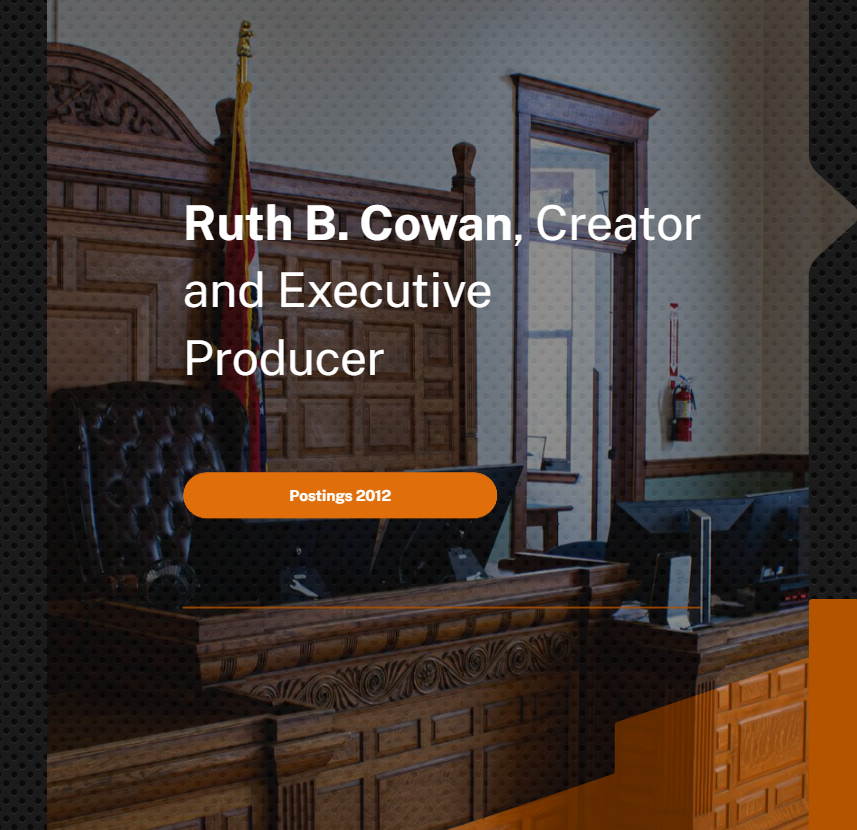April 17, 2012
Comments by students following the screening hosted by the Black Law Students Forum at the University of Cape Town on 17th April.
From a post-graduate student: I have studied law for all these years but have never thought about the human aspect behind passing judgment, The film highlighted the humanity of the judges. I have read the judgments made by some of these judges but have never thought of them as being made by real people – now I have a different perspective: the judgments have come alive in a new way for me… The editing was superb and seamless.
Other student responses:
It was an eye-opener to see these women as people in their own homes, caring for their families. This was so enlightening as I have never before considered the personal sacrifices judges, especially women judges, make.
I realised for the first time that choosing to become a judge implies that the option to make a lot of money from working in one’s own private practice disappears and the time spent with one’s family becomes less. This increased my admiration for the courage and bravery of these judges.
I don’t think I would let my wife leave to go off for two years to act as a judge to get experience to further her career!
I realised for the first time how different a woman’s perception is and how this perception creates a very important contribution to upholding the diversity within our judiciary.
Having a background in Media Studies before doing my law degree, I am so impressed with the cinematic quality of this film and its immensely moving rendition of the role of women in our judiciary. I would not have thought it possible to make such a beautiful and such an emotionally charged film about this subject matter. This film must be shown to the Media Studies students at our university to inspire and encourage them to extend the scope of vision about how important information such as the judiciary can come alive through the medium of film.
April 6, 2012
South Africa’s post apartheid constitution, acknowledging that an independent judiciary is essential to democracy declared the establishment of an indepedent judiciary. However, since the heady beginning of the country’s New Democracy, there have been many efforts to weaken and even challenge that independence. Incorporated under the tab “Courts” on this website is “The Rise and Fall of Two Chief Justices“, a paper prepared by Gilbert Marcus and Jason Brickhill. It tells the of a recent controversy regarding the judiciary’s independence.
March 28, 2012
Courting Justice has engaged thousands of middle school and high school students in south Africa through the creative and energetic efforts of Annette Fatti. Annette just returned from engaging students in the province of KwaZuluNatal. Here are her reflections upon returning home after ten days in Durban and Pietermaritzburg:
Once again I really enjoyed showing Courting Justice – each time I watch the film I enjoy it more! The trip was a huge success and the young adults at high schools where I visited made me proud to be a South African. The keen desire of the teenagers I met to keep democracy alive and well here in South Africa dispels so much of the pessimism I hear expressed so often from some friends and acquaintances!! The comments made by the girls (and many boys) were so positive and eloquent. Many of them said the film had changed their perspective of the life in South Africa and of the government. For many, CJ inspired the possibility of a new career choice.
February 21, 2012
Ghandi’s granddaughter was present at the screening on Human Rights day and I had some lovely photos of her – I gave each person present a copy of the film and they clearly enjoyed it and thought it a most valuable teaching tool for young South Africans. The Wednesday screening was for the Amnesty International group and they were very enthusiastic about CJ!! They have promised to give me many more contacts in KwaZuluNatal so I will probably be able to make another trip there this year!
Getting to Ottawa for the Courting Justice November event hosted by South Africa’s High Commission to Canada meant leaving 60 degrees to 10 below, a cancelled flight, rerouting with a mile long dash to catch the connecting flight. But, the audience obliterated the cold and the transportation drama. I introduced the film and participated in the post screening discussion. I sat next to two South Africans who were from the same rural area shown in the film and when those, in the film, sang, they joined in. Several in the audience left the event committed to arrange for screenings elsewhere in Canada and in Africa, and the High Commission wants to bring Courting Justice to all of Canada’s provinces.
An added pleasure for me was interest expressed by members of Canada’s International Women’s Forum. As a member of a “sister” forum in New York, I contacted IWF Canada to invite members in the Ottawa area to join me. They did. One forum member, a Senator, was unable to attend—but, eager to meet me, she invited me to Parliament for lunch. Before I left Ottawa she had already spoken about Courting Justice to a close friend, a University President who immediately started the process for Courting Justice to be seen at her university…
Three days after returning from Ottawa, I was in San Francisco for two Courting Justice events. The first was hosted by the Judicial Council of California—Administrative Office of the Courts and was held at the State building, which houses staff from the governor’s office, as well as personnel from the Supreme Court and Court of Appeal, First Appellate District. AOC employees were able to receive 1.5 hours of education credit. DVDs were provided to all AOC regional offices and it was posted on archived audiocasts of AOC Forums in the Training section of the AOC Intranet.
The second event, hosted by friends Sharon Miller and Alan Fisher, was at San Francisco University of California. The audiences at both events were deeply moved by Courting Justice. Many left committed to host or arrange for important screenings.
In between the two events, I met with a magistrate from Kenya. She was in San Francisco studying for an advanced law degree—the Dean of the law school where she is studying, and not incidentally an acquaintance, introduced us. The magistrate, also deeply moved by Courting Justice,committed herself to show the film in Kenya and at a regional meeting of African women judges.
When I returned from San Francisco I received an e mail from an acquaintance in London advising me she had shown the film to members of the UK International Women’s Forum affiliate and that one of those present, a judge, wants to have it shown at an international meeting of women judges scheduled for London this spring.
For me, the most meaningful testimonial comes from those who see Courting Justice and want to bring it to others.
January 20, 2012
Dr. Beatriz Kohen, Directora del Programa Genero y Derecho, Decano de la Facultad de Derecho, Universidad de Palermo, Buenos Aires, Argentina.
Introducing the screening of Courting Justice at the University of Palermo, Faculty of Law in Buenos Aires, Argentina on November 11,2011:
I believe there is a profound need to document the recently achieved increased participation of women in Argentina’s public life . This need is tied to the importance for younger women to know of the very different past and of the process by which militant women’s organizations allied with other organizations worked to effect democratic governance and strengthen democratic institutions. My aim is to produce a documentary film– I’m drawn to that medium because it is able to reach masses of people. Given my expertise I would concentrate on women within the judiciary—focusing both on their progress and on the continuing challenges.
As a scholar I, of course, searched what had been and was being done in using multi-media to document women in the judiciary. In my search I discovered Courting Justice. I contacted Ruth Cowan; she sent me the dvd.
I liked what I saw: Courting Justice put flesh on the bones of the concerns those of us who press for judicial gender diversity deal with: law’s built-in masculinity, women’s difficulties fitting into an institution infused with a male- gendered logic, women’s difficulties in accessing justice, the reasons behind the importance of appointing women to the courts, and the possibilities women judges present for a making a difference..
Concededly, no one now dares question the importance of having more women judges. At least the arguments appear to be accepted that the judiciary should reflect society’s diversity—and that diversity relates to the judiciary’s legitimacy. Interest is even shown to alternative feminist models.
Some of the arguments for more women on the bench are controversial—such as the view that women’s traditional role as care givers would enhance justice in the justice system. But, whatever the disagreements surrounding the arguments for increasing women’s judicial representation, there can be no disagreement about the significant the two women on this country’s Supreme Court and the woman as the Head of the National Public Defenders have had on the enforcement of women’s rights. These three women have made a difference , not only through their own official actions, but by influencing , for example, the creation of Women’s Office of the Supreme Court of the Nation, the Domestic Violence Office, gender mainstreaming in the Public Defender’s office—all of which are serving to further women’s rights. Argentina’s experience is one validation of position advocated in UNWOMEN’s last Biannual Report on Women’s Advancement in the World—i.e., that placing women in leadership positions is an important strategy for enforcing women’s rights.
January 6, 2012
The Final Prize; My Life in the Anti-Apartheid Struggle written by Norman Levy, has just been published. The author, effectively integrating biography and history, was engaged in opposing apartheid from the mid 1940’s to the 1990’s. In 1956 he, along with 155 others, was tried for treason in the apartheid government’s effort to suppress the opposition movement. The trial was, after five grueling years, dismissed as a result of prosecutorial incompetence. He was later held under the 90 Day Detention Law and in 1965 was tried and imprisoned. Norman Levy’s account is riveting and beautifully written.
When I am asked, as I frequently am, about the status of democacy in South Africa, I quote Norman Levy’s final paragraph:
” There is still much work to be done and our political culture has yet to match our liberal constitution. After 16 years of democracy the euphoria of liberation remains, but it is marred by contradictions that in our innocence we did not contemplate. For all our imaginings of a new society and a harmonious rainbow nation, these are ideals still in the making. There is no promised land, no earthly paradise, only the imperfect place we ourselves create and the vision we have to change it for the better.”


0 Comments